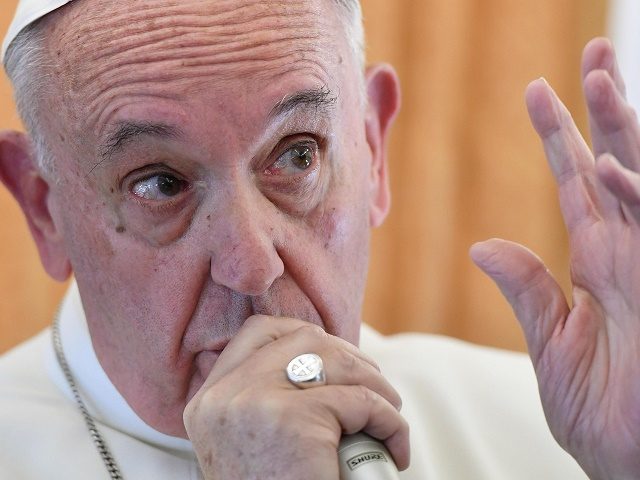In a period when Pope Francis is being challenged by a group of cardinals for alleged ambiguities in his teaching, the pontiff has called for openness to debate and pushback in the Church.
On Thursday, Francis delivered a lengthy discourse to members of the Roman Curia — the clergy and laypeople who assist the pope in governing the Catholic Church. In his address, he spoke of the need for ongoing reform in the Church and proposed a series of guidelines for reforming the Curia itself.
Francis said that in this process, “it is normal, and indeed healthy, to encounter difficulties, which in the case of the reform, might present themselves as different types of resistance.”
He went on to distinguish three types of “resistance,” the most healthy and constructive of which is “open resistance, often born of goodwill and sincere dialogue,” which he contrasted with “hidden resistance” and “malicious resistance.”
To Vatican observers, his words did not describe hypothetical situations, but real events, some of which have been widely discussed and debated.
Late last month, a leading cardinal and papal adviser acknowledged that many faithful Catholics are troubled by the state of affairs in the Catholic Church under Pope Francis, despite the pontiff’s popularity.
Australian Cardinal George Pell, who spearheaded the Pope’s financial reforms in the Vatican and is a member of the Pope’s “C9” group of closest advisers, said that “a number of regularly worshipping Catholics” are “unnerved by the turn of events” in the Church.
The Cardinal was referring to various issues, the most prominent of which was an open challenge by four leading cardinals, including the American Raymond Burke, a renowned canon lawyer and the former head of the Church’s highest court.
In September, the four cardinals wrote a private letter to Pope Francis asking him to clarify five serious doctrinal doubts proceeding from his 2016 “apostolic exhortation” Amoris Laetitia (The Joy of Love) concerning Holy Communion for the divorced and remarried, the indissolubility of marriage, and the proper role of conscience.
When the Pope failed to reply to the Cardinals’ letter, they proceeded to publish it online on Nov. 14, hoping in this way to provoke a response.
The publication of the letter, while criticized by some, would seem to fall in the category of “open resistance,” the sort that Francis praised in Thursday’s address.
Despite his apparent acceptance of “resistance,” however, Pope Francis has refused to respond to the five yes/no questions asked by a group of his closest advisers, which has led some to suspect that the Pope has purposely sought ambiguity while obliquely criticizing those who cling to “doctrine” and “tradition.”
Various pundits have attributed the Pope’s seemingly intentional vagueness to his training in the Jesuit order. “For those unfamiliar with Jesuits,” wrote Dominic Lynch in The Federalist, “vague and porous doctrine is almost their raison d’être. Indeed, it is so baked into the order that finding a conservative Jesuit is more difficult than finding a liberal in West Texas.”
On Thursday, the Pope said that “the good cases of resistance – and even those not quite so good – are necessary and merit being listened to, welcomed and their expression encouraged, because this is a sign that the body is living.”
Sooner or later, one suspects, Pope Francis will need to face the sincere questions raised by rank-and-file Catholics as well as leading cardinals, as to how his “reforms” square with the perennial doctrines espoused by the Church.
No matter how much a pope may dislike “doctrine,” Catholics believe he is ultimately responsible for teaching and preserving it, and no amount of pastoral sensitivity can take its place.
Follow Thomas D. Williams on Twitter Follow @tdwilliamsrome.

COMMENTS
Please let us know if you're having issues with commenting.